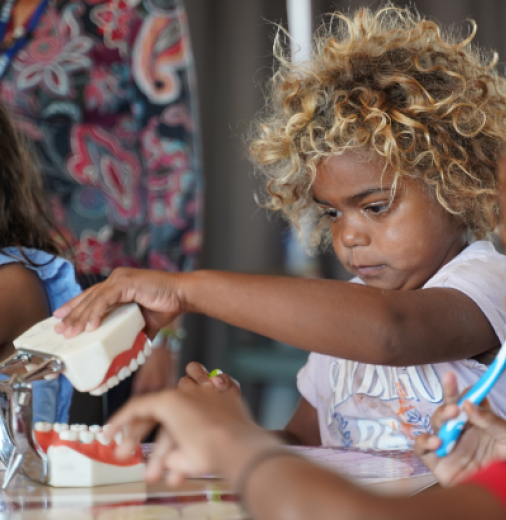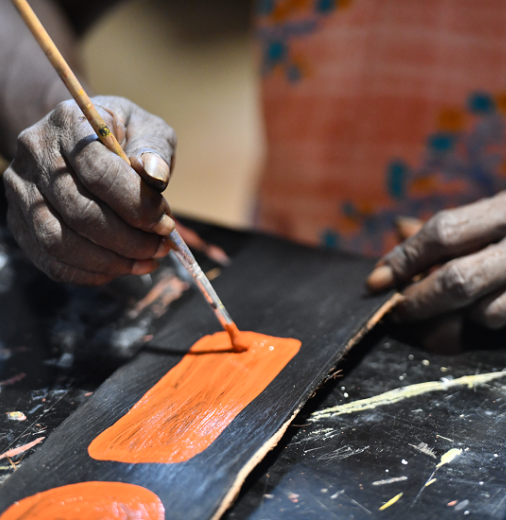Acknowledgement
The Australian Government shows respect by acknowledging the Traditional Custodians of Country throughout Australia and their continuing connections to land, waters and communities. We pay our respect to Aboriginal and Torres Strait Islander cultures and Elders past, present and future.
Language statement
We recognise the diversity of Aboriginal and Torres Strait Islander people living throughout Australia. We have used the words “Aboriginal and Torres Strait Islander peoples” and “First Australians” to refer to all people of Aboriginal or Torres Strait Islander descent, and “Aboriginal and Torres Strait Islander languages” when referring to languages that are indigenous to Australia. We have used “Indigenous languages” when referring to the international context, including languages that are Indigenous to other countries across the world. The exception to this is when listing the title of a program or initiative, such as the Indigenous Advancement Strategy. The collective noun “we” refers to the Australian Government.
International Perspective
The United Nations International Year of Indigenous Languages
The United Nations (UN) General Assembly has declared 2019 the International Year of Indigenous Languages (IY2019) to raise awareness of the crucial role languages play in people's daily lives.
In 2016, the UN reported that 40 per cent (2,680) of the estimated 6,700 languages spoken around the world were in danger of disappearing. Most of these are Indigenous languages, placing the world's cultures and knowledge systems at risk. Australia's languages are some of the most endangered in the world.
Language has complex implications for identity, cultural diversity, spirituality, communication, social cohesion, education and development. The UN recognises that language is a core component of human rights and fundamental freedoms.i The IY2019 aims to contribute to the attainment of the goals of the UN Declaration on the Rights of Indigenous Peoples. It also reinforces goals under the 2030 Agenda for Sustainable Development and the United Nations system-wide action plan on the rights of Indigenous peoples.
The UN Educational, Scientific and Cultural Organisation (UNESCO) is leading and organising the IY2019. UNESCO worked with governments, Indigenous peoples' organisations, researchers and other stakeholders to create a UNESCO Action Plan that sets out the path to achieving the objectives of the IY2019. It calls for a coherent approach and for joint collaborative action by all stakeholders to achieve maximum positive effect and social change with regard to Indigenous languages and those who speak them.
UNESCO Objectives
The Australian Government recognises UNESCO's objectives for the IY2019. Through participating in the IY2019, the Australian Government will ultimately contribute to UNESCO's objectives, which include:
- Focusing global attention on the critical risks confronting Indigenous languages and the significance of such risks for sustainable development, reconciliation, good governance and peacebuilding.
- Targeting steps which will lead to improved quality of life, enhanced international cooperation and strengthened intercultural dialogue, and reaffirming cultural and linguistic continuity.
- Delivering increased capacities on the part of all stakeholders to take concrete and sustainable measures at every level to support, access and promote Indigenous languages around the world in accordance with the legitimate rights of Indigenous peoples.
The Australian Government supports the United Nations Declaration on the Rights of Indigenous Peoples and respects our commitments under the 2005 UNESCO Convention on the Protection and Promotion of the Diversity of Cultural Expressions.
Australian Government Themes
In participating in the IY2019, the Australian Government is committed to undertaking actions in the following thematic areas. These have been adapted from UNESCO's themes, listed in the UNESCO Action Plan.
- Support for the revitalisation and maintenance of Aboriginal and Torres Strait Islander languages
- Access to education, information and knowledge in and about Aboriginal and Torres Strait Islander languages
- Promotion of Aboriginal and Torres Strait Islander knowledge and values
The Australian Government vision
The Australian Government’s vision is for an Australia where respect for our rich diversity begins with respect for the world’s oldest continuing cultures, that of our First Australians. In partnership with Aboriginal and Torres Strait Islander peoples, we commit to strengthening the support for Australia’s Aboriginal and Torres Strait Islander languages.
The Australian Government recognises the many benefits to its citizens when all Australian languages are respected and kept strong. Most critically, Aboriginal and Torres Strait Islander languages are essential to ensuring the sustainability, vitality and identity of Aboriginal and Torres Strait Islander peoples. The strength of and access to Australia's Aboriginal and Torres Strait Islander languages has been shown to reap economic, social and intrinsic benefits to individuals and communities. They enrich Australia's cultural life, make a valuable contribution to our national economy and are seen as a cultural asset internationally. Languages have been shown to contribute to improvements in the health and wellbeing of Australians, education outcomes, environmental science and management, and economic prosperity.ii
Aboriginal and Torres Strait Islander languages in Australia
Of the estimated 250 original Aboriginal and Torres Strait Islander languages in Australia, it was found in 2012 that 120 are still spoken and of these 13 are considered strong in the sense that they are still spoken by all age groups.iii The 13 strongly spoken languages is a decline from the 18 found to be strong in 2004.iv Some languages considered to be strong also show signs of declining vitality.v
While there are endangered Aboriginal and Torres Strait Islander languages across Australia, the number of languages, the number of speakers, and the fluency of these speakers can vary within each community, or language group. There are many factors that can influence the use of language by Aboriginal and Torres Strait Islander Australians and these vary considerably across the country, such as the challenges caused by geography, accessibility or strength of the language.
Our commitment to IY2019
The Australian Government is committed to supporting Aboriginal and Torres Strait Islander peoples to preserve and rejuvenate their languages. We will promote opportunities for Australians to participate in a variety of activities for the IY2019. Support will be focused on ensuring Aboriginal and Torres Strait Islander languages thrive, are celebrated, and are considered across whole of government services and policies.
Our principles
In line with UNESCO's IY2019 international principles of centrality, compliance, joint action, building strengths, a holistic approach and synergy, the Australian Government is committed to the following principles:
- The centrality of Aboriginal and Torres Strait Islander peoples to the Australian Government's IY2019 activities, ensuring Aboriginal and Torres Strait Islander voices are placed at the centre of initiatives and that initiatives are undertaken in a culturally appropriate manner.
- Encouraging and supporting wide participation in the IY2019 across the Australian Government, ensuring support for activities across sectors is delivered collaboratively, coherently and efficiently.
- Considering the legacy of activities and profile of the IY2019 and integrating this into broader, continuing support for Aboriginal and Torres Strait Islander languages.
- Engaging with the international system to deliver the Australian Government response to the IY2019, including actively participating in international forums as a member of the International Steering Committee for organising the IY2019, and working with considerations for other United Nations mechanisms.
1. Centrality of Aboriginal and Torres Strait Islander peoples
At an international, national and local level there is a clear commitment to working in partnership with Indigenous peoples.vi It is also critical to work with Aboriginal and Torres Strait Islander Australians on Indigenous languages.vii Outcomes are unlikely to be achieved without collective efforts to build these relationships across all levels of government.
Cultural authority, community control and engagement are paramount to delivering successful outcomes for the IY2019. The Australian Government will prioritise Aboriginal and Torres Strait Islander voices in the IY2019, by working with Aboriginal and Torres Strait Islander peoples to ensure that Aboriginal and Torres Strait Islander stories are told in Aboriginal and Torres Strait Islander ways. This can be achieved through:
- conveying what is important to Aboriginal and Torres Strait Islander Australians
- connecting Aboriginal and Torres Strait Islander Australians in a way that is meaningful and true
- recognising, celebrating and showcasing work of Aboriginal and Torres Strait Islander Australians on languages
- ensuring that all stakeholders incorporate a number of mechanisms for Aboriginal and Torres Strait Islander people and organisations to engage throughout the IY2019.
Throughout the year, the Australian Government will work to ensure Aboriginal and Torres Strait Islander voices are central to IY2019 and its activities and will highlight the importance of this by showcasing best practice examples.
2. Wide participation and collaboration
Support for languages must be considered holistically. The Australian Government is taking a multi-stakeholder approach and collaborating with other sectors and jurisdictions to actively prepare a comprehensive strategy to participate in the IY2019. This Action Plan is intended to encourage collaboration between multiple sectors, including Aboriginal and Torres Strait Islander peoples' representatives, Government departments, state, territory and local governments, academia, non-government organisations, private sector groups, and other interested organisations.
The declaration of the IY2019 provides an opportunity to realise the benefits that accrue from a coordinated and strategic approach to Aboriginal and Torres Strait Islander languages. This is why the Australian Government will come together across portfolios to coordinate our efforts for IY2019.
3. The legacy of IY2019
IY2019 provides an opportunity for the Australian Government to consider long term, sustainable outcomes to support Aboriginal and Torres Strait Islander languages beyond the window of the IY2019. The IY2019 is not a standalone event, but rather an opportunity to elevate the ongoing conversation about support for Aboriginal and Torres Strait Islander languages through the IY2019 and beyond.
4. Engaging with the international system
The Australian Government recognises that a significant contributor to the success of the IY2019 is strong contributions from member states to the UNESCO International Steering Committee (ISC) responsible for driving the IY2019. Australia is represented on the ISC by the delegate for the Asia Pacific region, Mr Craig Ritchie, CEO of the Australian Institute of Aboriginal and Torres Strait Islander Studies (AIATSIS). Mr Ritchie is co-chair of the ISC.
Australian Government actions
This Australian Government Action Plan includes actions to support Aboriginal and Torres Strait Islander languages from across Australian Government departments and agencies. These actions are grouped under the Australian Government's interpretation of the UNESCO IY2019 themes, as listed above (Support for the revitalisation and maintenance of Aboriginal and Torres Strait Islander languages; Access to education, information and knowledge in and about Aboriginal and Torres Strait Islander languages; and Promote Aboriginal and Torres Strait Islander knowledge and values).
Each of the themes has a set of aims associated with it, along with examples of some of the specific actions that will be undertaken to meet these strategies.
A Calendar of Activities accompanies this Action Plan. It lists specific activities and events that are available to people from particular sectors to attend, as well as to the general public. The associated Calendar of Activities also lists known state and territory activities. The Calendar of Activities is a living document, with contributions from stakeholders continuously added as the IY2019 progresses.



































